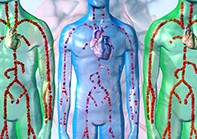Peer Reviewed
Feature Article Cardiovascular medicine
Comorbidities in chronic heart failure: increased risk requiring increased vigilance
Abstract
Chronic heart failure is complex and may be associated with many other major conditions, such as hypertension, atrial fibrillation, ischaemic heart disease and type 2 diabetes. Treating these comorbidities judiciously can achieve the three major goals of improving survival, improving symptoms and reducing hospitalisations. Patients with chronic heart failure require regular monitoring of their cardiac situation because they are at an increased risk of deterioration if their general health or comorbidities worsen.
Key Points
- Heart failure is a common, increasingly complex condition, with a high morbidity and mortality. It is associated with a high rate of hospitalisations and readmissions making it a very expensive condition.
- Heart failure leads to a poor quality of life due to dyspnoea and fatigue, and current therapy has made only some progress into treating these factors.
- As most people with heart failure are elderly there is a high incidence of comorbidities, which have a major influence on the patients’ heart failure symptoms and readmission rate.
- Treating the comorbidities judiciously can have a favourable impact on symptoms, hospitalisation rates and ultimately survival in these complex and unwell patients.
Picture credit: © Animated Healthcare Ltd/SPL
Purchase the PDF version of this article
Already a subscriber? Login here.

